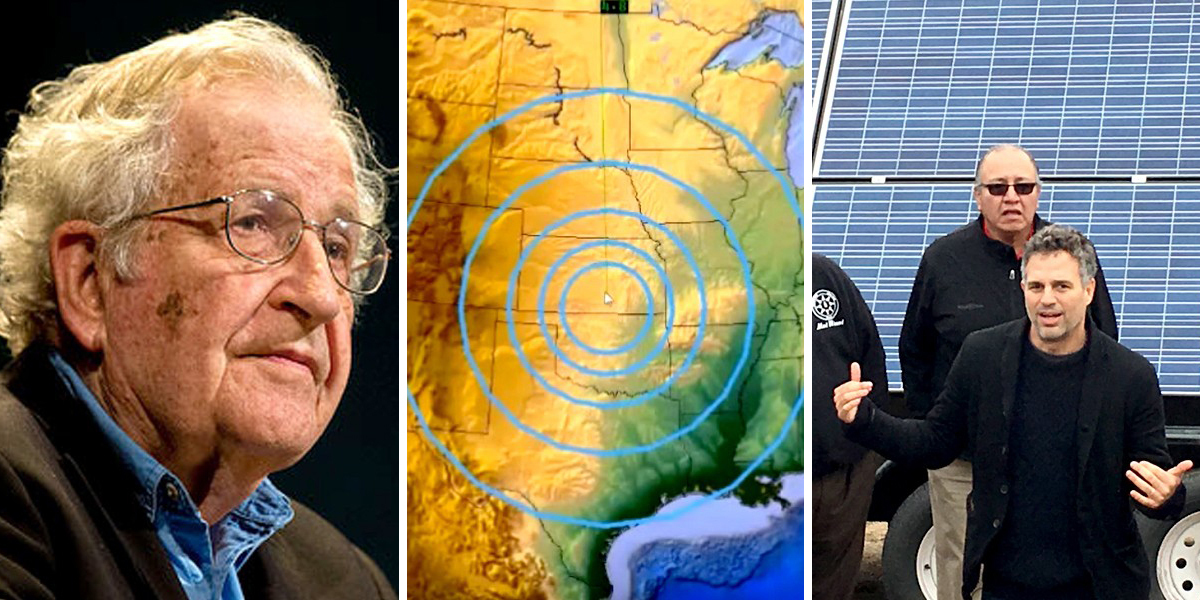

From Noam Chomsky’s epic post on his fears of the coming Trump Administration to Michael Moore’s damnation of the Flint water crisis to Robert F. Kennedy, Jr.’s first-hand account of the Standing Rock Sioux Tribe’s fight against the Dakota Access Pipeline, 2016 was jam-packed with news once again showing our continued disregard for the health of people and the planet.
Though there were many positive news stories last year of people, companies and governments making strides to adopt sustainable practice and transition to renewable energy sources, the world’s top scientists still fear the worse as atmospheric CO2 concentrations are just above 400 parts per million, taking us closer to the “danger zone” of 2 degrees celsius increase in temperature relative to pre-industrial time.
Many people think we have already reached the tipping point, but I believe power of people can turn this around. So, here’s to a 2017 where millions more people become engaged on the most important environmental issues impacting the future of our planet.
Please read and share our content to get more people involved. You can like us on Facebook, follow us on Twitter and sign up to receive our Most Read News of the Day.
Here are EcoWatch’s 20 most read posts of 2016:
1. Noam Chomsky: ‘The Republican Party Has Become the Most Dangerous Organization in World History’
Noam Chomsky: 'The Republican Party Has Become the Most Dangerous Organization in World History'
via @EcoWatch: https://t.co/2F68fmwa1z— Prof Michael E. Mann (@MichaelEMann) December 2, 2016
2. World’s Largest Solar Project Would Generate Electricity 24 Hours a Day, Power 1 Million U.S. Homes
The world's largest solar project would generate electricity 24h/day & power 1 million U.S. homes. https://t.co/l0O8ONf8SA via @EcoWatch
— NRDC ?? (@NRDC) October 22, 2016
3. Solar Impulse Pilot: ‘I Flew Over Plastic Waste As Big As a Continent’
Solar Impulse Pilot: 'I Flew Over Plastic Waste As Big As a Continent' https://t.co/plZAn3qlZX @ecowatch #pollution
— Blue Planet Society (@Seasaver) April 27, 2016
4. Lake Powell: Going, Going, Gone?
Lake Powell: Going, Going, Gone?#CORiver #ColoradoRiver https://t.co/SXFRqrAKGm@billmckibben @EcoWatch pic.twitter.com/YucBjs8Cuy
— Save The World's Rivers! (@SaveTheColorado) August 15, 2016
5. Mark Ruffalo Delivers Solar Panels to Camp Where Thousands Are Fighting the Dakota Access Pipeline
.@MarkRuffalo Delivers Solar Panels to Camp Where Hundreds Are Fighting Dakota Access Pipeline via @EcoWatch: https://t.co/KL8AwRuETJ
— Leonardo DiCaprio (@LeoDiCaprio) October 27, 2016
6. Scientists Uncover Array of Strange Animals in Cave That Has Been Sealed Off for 5.5 Million Years
https://twitter.com/EcoWatch/status/735173257993801728
7. Nation’s Longest Bike Path Will Connect Maine to Florida
Nation's Longest Bike Path Will Connect Maine to Florida https://t.co/fhvEmpIQup (via @EcoWatch @ECGreenway)
— Sierra Club (@SierraClub) July 31, 2016
8. Scientists Are Freaking Out Over This 25-Year-Old’s Solution to Superbugs
Scientists Are Freaking Out Over This 25-Year-Old's Solution to #Superbugs https://t.co/Laxbm4QXd3
— EcoWatch (@EcoWatch) September 26, 2016
9. World’s Biggest Sockeye Run Shut Down as Wild Pacific Salmon Fight for Survival
World's Biggest Sockeye Run Shut Down as Wild Pacific Salmon Fight for Survival via @EcoWatch https://t.co/NVwCjoxcdI
— Wildlife Action (@wildlifeaction) September 22, 2016
10. Michael Moore: 10 Things They Won’t Tell You About the Flint Water Tragedy, But I Will
Michael Moore: 10 Things They Won't Tell You About the Flint Water Tragedy, But I Will https://t.co/a3lvwIwPi8 @CleanWaterMI @NRDCWater
— EcoWatch (@EcoWatch) January 30, 2016
11. 800,000 People Attempt to Plant 50 Million Trees to Break Guinness World Record
50,000,000 Trees, 800,000 People, 24 Hours = 1 World record https://t.co/B7F2CmLUG2 via @EcoWatch @GWR #India pic.twitter.com/FcZzEghcXv
— Conservation Guide (@ConserveGuide) July 16, 2016
12. It’s Official: Injection of Fracking Wastewater Caused Kansas’ Biggest Earthquake
Injection of #Fracking Wastewater Caused Kansas’ Biggest Earthquake https://t.co/XSSfMTefDV @POTUS @EPA @GinaEPA #banfracking via @EcoWatch
— Frack Action (@FrackAction) October 14, 2016
13. Monsanto’s Glyphosate Found in California Wines, Even Wines Made With Organic Grapes
#Monsanto's #Glyphosate Found in California Wines, Even Wines Made With Organic Grapes https://t.co/8IkSC4EiJf via @ecowatch #health #cancer
— Green Bean (@iamgreenbean) March 29, 2016
14. Robert F. Kennedy, Jr: ‘I’ll See You at Standing Rock’
Robert F. Kennedy, Jr: 'I'll see you at #StandingRock' https://t.co/YOs1gMR9b4 via @EcoWatch #climate #NoDAPL #divest pic.twitter.com/bJgwSlLZqB
— climatehawk1 (@climatehawk1) December 1, 2016
15. Federal Bill Seeks First Native American Land Grab in 100 Years
Unspeakable bill that must be defeated RT Federal Bill Seeks First Native American Land Grab in 100 Years @EcoWatch https://t.co/0zId8y09WK
— Bianca Jagger Nicaraguense por gracia de Dios ?? (@BiancaJagger) September 20, 2016
16. ‘Brilliant’ Climate Change Cartoon Goes Viral After Elon Musk, John Green Share It on Twitter
Climate Change Cartoon Goes Viral After Elon Musk, John Green Share It on Twitter https://t.co/keqkzCC0oG @TheCCoalition @carbonmeme
— EcoWatch (@EcoWatch) September 15, 2016
17. Syria: Another Pipeline War
.@RobertKennedyJr: #Syria: Another #Pipeline #War https://t.co/YD2NJnpRss @MarkRuffalo @LeoDiCaprio @350 @sierraclub pic.twitter.com/im9w66DfN3
— EcoWatch (@EcoWatch) February 25, 2016
18. Epic Middle East Heat Wave Is Being Compared to Weapon of Mass Destruction
Epic Middle East Heat Wave Is Being Compared to Weapon of Mass Destruction via @EcoWatch https://t.co/OryjBYBD6J #YEARSscience
— The YEARS Project (@YEARSofLIVING) August 14, 2016
19. Listen to Sen. Inhofe’s Response to His Granddaughter Asking Him: ‘Why Is It You Don’t Understand Global Warming?’
Listen to Sen. Inhofe's Response to His Granddaughter Asking Him: 'Why Is It You Don't Understand Global Warming?' https://t.co/McSXXLXAKp
— EcoWatch (@EcoWatch) August 2, 2016

 233k
233k  41k
41k  Subscribe
Subscribe 